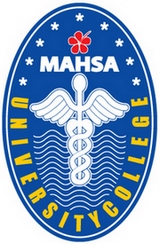Diploma in Environmental Health, MAHSA University College, Kuala Lumpur, Malaysia
 Environmental health is the branch of public health that is concerned with all aspects of the natural and built environment that may affect human health. Other terms that refer to the discipline of environmental health include environmental public health and environmental health and protection.
Environmental health is the branch of public health that is concerned with all aspects of the natural and built environment that may affect human health. Other terms that refer to the discipline of environmental health include environmental public health and environmental health and protection.
Environmental health is defined by the World Health Organization as:
Those aspects of human health and disease that are determined by factors in the environment. It also refers to the theory and practice of assessing and controlling factors in the environment that can potentially affect health.
Environmental health practitioners may be known as sanitarians, public health inspectors, environmental health specialists or environmental health officers.
Environmental health addresses all human-health-related aspects of both the natural environment and the built environment.
Environmental health concerns include:
- Air quality, including both ambient outdoor air and indoor air quality, which also comprises concerns about environmental tobacco smoke.
- Climate change and its effects on health.
- Disaster preparedness and response.
- Food safety, including in agriculture, transportation, food processing, wholesale and retail distribution and sale.
- Hazardous materials management, including hazardous waste management, contaminated site remediation, the prevention of leaks from underground storage tanks and the prevention of hazardous materials releases to the environment and responses to emergency situations resulting from such releases.
- Housing, including substandard housing abatement and the inspection of jails and prisons.
- Childhood lead poisoning prevention.
- Land use planning, including smart growth.
- Liquid waste disposal, including city wastewater treatment plants and on-site waste water disposal systems, such as septic tank systems and chemical toilets.
- Medical waste management and disposal.
- Noise pollution control.
- Occupational health and industrial hygiene.
- Radiological health, including exposure to ionizing radiation from X-rays or radioactive isotopes.
- Recreational water illness prevention, including from swimming pools, spas and ocean and freshwater bathing places.
- Safe drinking water.
- Solid waste management, including landfills, recycling facilities, composting and solid waste transfer stations.
- Toxic chemical exposure whether in consumer products, housing, workplaces, air, water or soil.
- Vector control, including the control of mosquitoes, rodents, flies, cockroaches and other animals that may transmit pathogens.
MAHSA University College Location Map
MAHSA University College Contact Details
Address:
MAHSA University College,
Level 6, Block A, Pusat Bandar Damansara,
Damansara Heights,
50490 Kuala Lumpur,
Malaysia.
Phone: +6(03)2092 9999
Fax: +6(03)2093 1599
Email: marketing@mahsa.edu.my
Website: http://www.mahsa.edu.my
